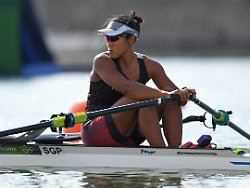Saturday 24th July 2021
Training after the clinic shift
The tireless journey of a rower
By Sebastian Schneider
In her first row, Joan Poh is 45 seconds behind the first. During the pandemic, she stopped her preparations for the Olympic Games and looked after patients in Singapore – because the 30-year-old is actually a nurse.
Sometimes it’s the odd stories that make the Olympic Games so special. Especially in pandemic times. One of them is that of Joan Poh. Their games started with a special moment. For the first time in 15 months, she met her trainer again. The Canadian Laryssa Biesenthal coached Poh virtually from a distance for a long time. For almost a year and a half there was a time difference of 12 hours between the two-time bronze winner and the Singapore athlete. The trained nurse Poh took on a lot for her Olympic dream.
She is one of only 23 athletes who traveled from Singapore to the Olympics. Most of them are for swimming, table tennis or sailing. The 30-year-old is the only one who competes in rowing, in one of the women. She only came to the sport in 2014, and she also began with sailing and the dragon boat. She began her preparation in early 2019 with trips to Hong Kong, Greece, China, Canada and Australia. For this, she left the hospital where she worked for 16 months without pay.
During the time she was preparing for the mega-event and fine-tuning her technology, the coronavirus spread bit by bit all over the world. Also in her home country Singapore. At the beginning of 2020, the Singapore government asked the medical staff for help. So also Poh. As a nurse, she “felt a growing sense of responsibility,” as herself later said.
Between ten-hour shifts and rowing training
Poh stopped her training and returned. She wanted to give something back to the hospital that supported her in her Olympic dreams and put her ambitions on hold. She was never an “athlete who won something”, she said, everything she had “was a dream”, but there was always support from her job.
Back in Singapore, as a dialysis expert, she was not on the front line of the corona, but was relatively close to her. Kidney failure is a possible complication in Covid patients. Then they have to rely on the help of the rower Poh. During those busy months, she had never really buried her dream of Tokyo. Although it was unclear when the pandemic would end or whether the Olympics would even take place.
In the hospital, she worked ten-hour shifts. Before and after she pushed in the training blocks. Sometimes straight from work to the gym. In between, she had to step in for emergency shifts from time to time. Sometimes she did without a meal in return. To make up for the lost time, she spent the weekends completely on the water every now and then, like her “New York Times” said: “When I’m at work, I’m 100 percent a nurse. When I train, I’m 100 percent a rower. It’s always about finding balance.”
The experiences from the hospital changed her everyday life, even when she focused on rowing again in March 2021. Often she is the only one who disinfects her seat on the bus or does not put down the backpack for fear of contamination. And for that she gets looks from the other people around her.
It’s like freshly washed laundry
For most of the 11,000 or so athletes, the past year and a half have been a time of uncertainty. Also a time of worry. Will the games take place? Will I stay healthy until then? Poh is one of the 11,000 who never knew exactly whether their big dream would come true. In contrast to a European football championship, it is not just professional athletes who compete in the games.
The big money is rarely found in clubs. They depend on their support for their jobs, grants and funding. Everything is subordinated to the Olympics. So did Poh too. During her entire time in the hospital, it was never clear whether the Games would take place. Even in early May 2021, it was not yet completely clear whether it would be reported.
Poh was surprisingly relaxed about the uncertainty, like her The Straits Times told in early May. It was like having freshly washed laundry. Do you keep your wet laundry inside even if you are unsure whether it will still rain? “No. The logical thing is to hang them outside to dry and wait until the last minute for it to rain. Only then do you bring them in.” Joan Poh was lucky. Well, symbolically, her Olympic underwear stayed dry and she could travel to Tokyo. As the second rower in her country, she will represent Singapore there. She may not be an “athlete who wins something” – but her story breathes the Olympic spirit.
.
